
Harry Stewart New was a U.S. politician, journalist, and Spanish–American War veteran. He served as Chairman of the Republican National Committee, a United States senator from Indiana, and United States Postmaster General.
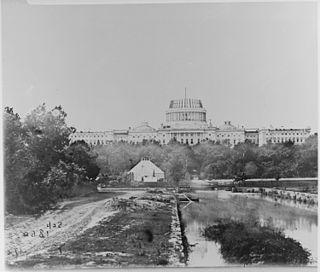
The 35th United States Congress was a meeting of the legislative branch of the United States federal government, consisting of the United States Senate and the United States House of Representatives. It met in Washington, D.C. from March 4, 1857, to March 4, 1859, during the first two years of James Buchanan's presidency. The apportionment of seats in the House of Representatives was based on the 1850 United States census. Both chambers had a Democratic majority.

The 1858–59 United States House of Representatives elections were held on various dates in various states between June 7, 1858, and December 1, 1859. Each state set its own date for its elections to the House of Representatives. 238 representatives were elected in the new state of Oregon, the pending new state of Kansas, and the other 32 states before the first session of the 36th United States Congress convened on December 5, 1859. They were held during President James Buchanan's term.
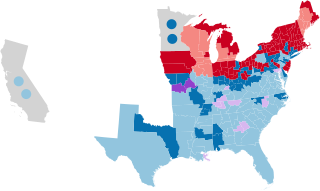
The 1856–57 United States House of Representatives elections were held on various dates in various states between August 4, 1856, and November 4, 1857. Each state set its own date for its elections to the House of Representatives. 236 representatives were elected in 31 states and the pending new state of Minnesota before the first session of the 35th United States Congress convened on December 7, 1857.

Jehu Glancy Jones was a Democratic member of the U.S. House of Representatives from Pennsylvania. Often called Glancy, he was a top adviser on Democratic Party affairs to his close friend James Buchanan, especially when President-elect Buchanan was picking his cabinet in 1856-1857. After he was defeated for reelection, Buchanan appointed him Ambassador to the Austrian Empire.
Aaron Hobart was a U.S. Representative from Massachusetts. Born in Abington, Massachusetts, Hobart pursued classical studies and graduated from Brown University in 1805. He studied law, was admitted to the bar and commenced practice in Abington. He served as member of the Massachusetts House of Representatives and served in the Massachusetts State Senate.
The 1796 United States Senate special election in New York was held on November 9, 1796, by the New York State Legislature to elect a U.S. Senator to represent the State of New York in the United States Senate.
The 1801 United States Senate election in New York was held on January 27, 1801, by the New York State Legislature to elect a U.S. Senator to represent the State of New York in the United States Senate.
The 1815 United States Senate election in New York was held on February 7, 1815, by the New York State Legislature to elect a U.S. Senator to represent the State of New York in the United States Senate.

The 1858–59 United States Senate elections were held on various dates in various states. As these U.S. Senate elections were prior to the ratification of the Seventeenth Amendment in 1913, senators were chosen by state legislatures. Senators were elected over a wide range of time throughout 1858 and 1859, and a seat may have been filled months late or remained vacant due to legislative deadlock. In these elections, terms were up for the senators in Class 2.
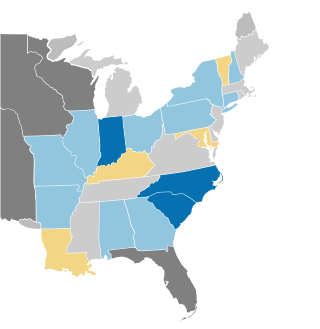
The 1842–43 United States Senate elections were held on various dates in various states. As these U.S. Senate elections were prior to the ratification of the Seventeenth Amendment in 1913, senators were chosen by state legislatures. Senators were elected over a wide range of time throughout 1842 and 1843, and a seat may have been filled months late or remained vacant due to legislative deadlock. In these elections, terms were up for the senators in Class 3.

Ohio elected its members October 12, 1858, netting a 3-seat Republican gain.
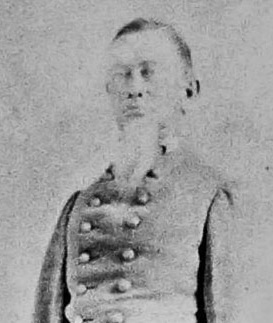
The 1858 United States House of Representatives election in Florida was held on Monday, October 4, 1858 to elect the single United States Representative from the state of Florida, one from the state's single at-large congressional district, to represent Florida in the 36th Congress. The election coincided with the elections of other offices, including various state and local elections.

California held its election September 7, 1859. From statehood to 1864, California's members were elected at-large, with the top finishers winning election.
Minnesota became a new state in 1858 having already elected its first two members at-large in October 1857 to finish the current term. The state then held elections to the next term October 4, 1859.

The 1858 United States elections occurred in the middle of Democratic President James Buchanan's term and marked the end of the transitional period between the Second Party System and the Third Party System. Members of the 36th United States Congress were chosen in this election. In the first election since the Supreme Court decided Dred Scott v. Sandford, the Republican Party won a plurality in the House, taking control of a chamber of Congress for the first time in the party's history. Although Democrats lost control of the House, they retained their majority in the Senate.
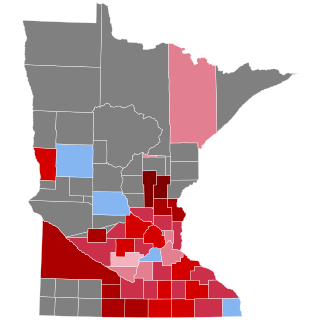
The 1860 United States presidential election in Minnesota took place on November 6, 1860, as part of the 1860 United States presidential election. Minnesota voters chose four representatives, or electors, to the Electoral College, who voted for president and vice president.
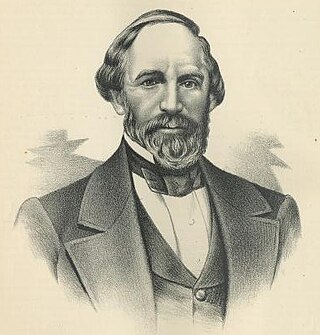
The 1858 Michigan gubernatorial election was held on November 2, 1858. Republican nominee Moses Wisner defeated Democratic nominee Charles E. Stuart with 53.77% of the vote.

The 1858 Connecticut gubernatorial election was held on April 5, 1858. Former Norwich mayor and Republican nominee William Alfred Buckingham defeated former congressman and Democratic nominee James T. Pratt with 51.97% of the vote.

The 1858 Massachusetts gubernatorial election was held on November 2. Incumbent Republican governor Nathaniel Banks was easily re-elected to a second term in office, beginning a period of Republican dominance which would extended into the 1870s.